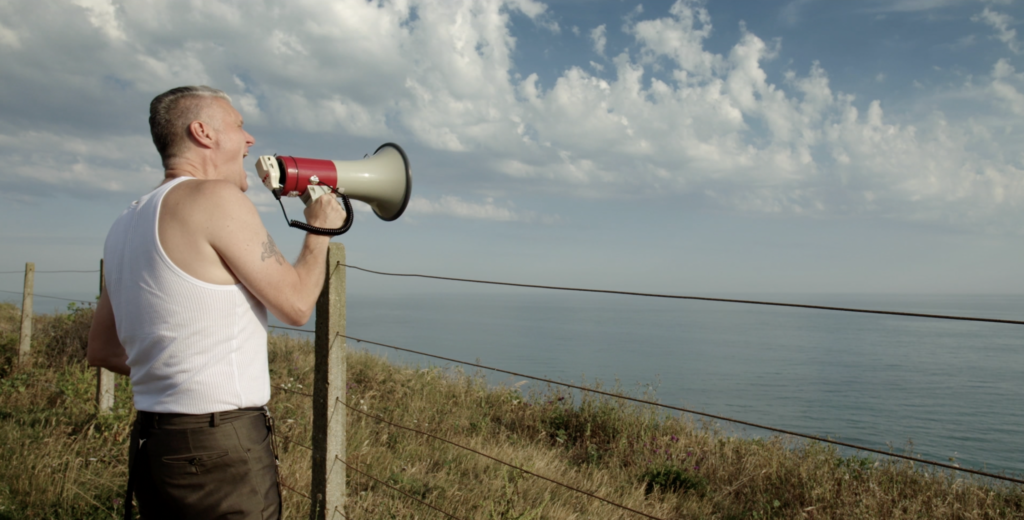
“My name is Dunstan Bruce. I’m a 59 year old man, and I’m struggling.”
So opens Dunstan Bruce’s film I Get Knocked Down, an artistic documentary about youthful radical idealism, the 90’s hit radio song “Tubthumping” by the band Chumbawamba, and the complexities of whether that music was able to worm anarchist politics into the mainstream at large or if it was the last gasps an aging revolutionary musical collective… told by one of the group’s members.
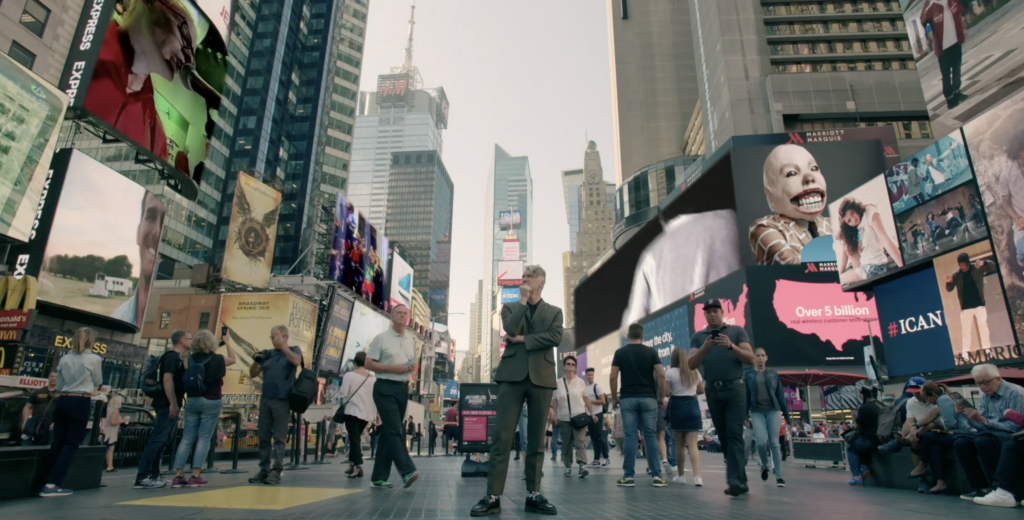
Now primarily known as a footnote in popular culture nearly three decades ago, I believe it should be said here that if there were ever a band worthy of a deep dive beyond the surface and into their full catalog and history, Chumbawamba is that band. Formed in 1982 after members were inspired by the explosion of punk music and radical politics, the British band joined individuals whose eyes were larger than their musical abilities. This band would go to release dozens of records that managed to stay innovative across different musical styles. By many standards, this career would be seen as a success. However it’s the idea of ‘success’ that Bruce dwells upon throughout this film.
“It doesn’t matter if we were any good because we’d swap instruments between every song anyways,” recounts one member of the group who Bruce tracks down. Chumbawamba officially broke up in 2012 (though a mock historical marker placed by Bruce and Chumbawamba drummer Harry Hamer outside the band’s old collective house outside the British city of Leeds enigmatically notes the band’s end as 1999). Bruce spends the film dissecting his current life as an adult reckoning with the aims and the reality of what the band set out to accomplish – the spreading of radical politics and a sense of personal liberation that transcends political leanings – versus that which did emerge in the wake of the once ragtag group signing to a major label.
Notably, the film sheds light on the beginnings of the band, including images and video of the early years where performances were more a noisy musical theater than proper shows. Bruce spends much of the film meeting and speaking with other members of the group in the more recent past. Through this, others share their feelings in the beginning.
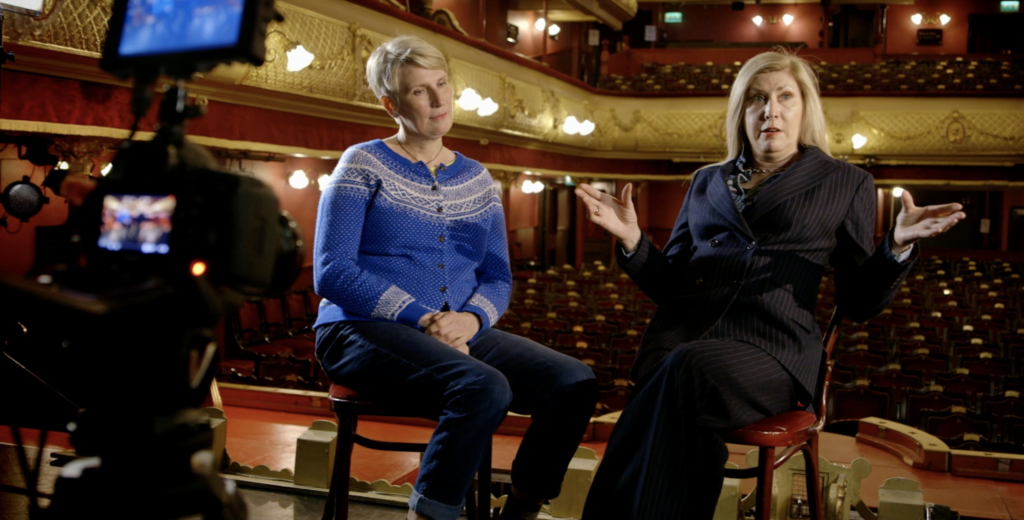
“It’s like a perfect storm when things come together and happen. It really felt like anything was possible,” recounts Lou Watts, one of the group’s vocalists.
From squatting their home, to learning to harmonize and eventually releasing not so amateur music, to what a couple different members explain as the Chumbawamba way of walking into a scenario and immediately thinking of how they can affect chaos, or at the very least, throw a wrench into business-as-usual.
“We wanted to shout like Crass. And then we wanted it to sound like The Beatles,” founding member Boff Whalley says to Bruce of the group’s intentions.
In the most thorough retelling of the group’s history since Bruce’s own film Well Done, Now Sod Off (released in 2000 and can be watched via a quick online search, though Well Done’s running time is around 60 minutes compared to I Get Knocked Down’s lengthier 92 minutes), members talk about the menial jobs they were working while trying to survive and still devote time to the band. This is noted as one of the reasons the group eventually chose to leave the underground music scene and sign with a major label. The album Tubthumper would be the first project released, and the band found themselves caught up in a whirlwind of television appearances and award shows, while redirecting many of their licensing fees and payments toward activist projects and organizations.
An interesting scene uses one aged punk in a dusty record store describing the mega hit as Chumbawamba selling out the punks. Meanwhile Bruce describes how the band’s revulsion with the empty consumption of their music makes them an ill fit for the larger music industry. The group’s outspoken opinions and tendencies toward pranks land them in hot water with mainstream media, and Bruce wonders if their underlying radicalism ever actually made it beyond the lyric sheets.
Since the ultimate dissolution of Chumbawamba, Dunstan Bruce has often combined music with film in his creative life. His director credits include films about punk group Sham 69 and folk punk band Levellers. His work has screened on the film festival circuit. Though in contrast to Well Done.., his previous work about his own band, I Get Knocked Down gives an updated look with 20 years more perspective, as focuses the camera and storyline inward.
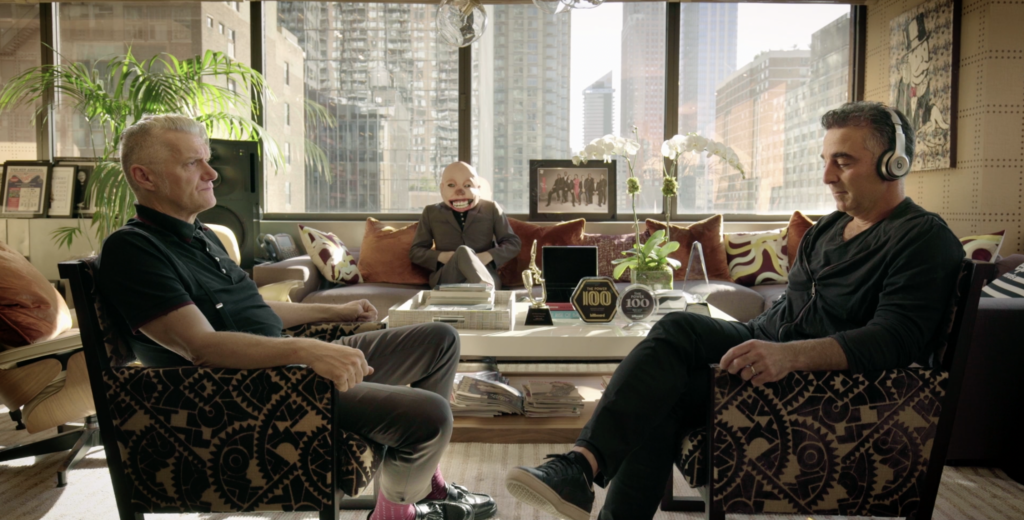
Two interesting segments in I Get Knocked Down are when Bruce sits down with Avery Lipman, president of Republic Records who released Tubthumper, and who was responsible for cleaning up the messes and entropy left in the band’s wake. Lipman laughs, saying that in hindsight he felt the band’s message went over the heads of the listening public. From there Bruce meets with Penny Rimbaud, the sage mind behind the band and anarchist collective Crass, who explains that he believed Chumbawamba’s message of anarchy shouted through microphones owned by the largest media firms in the world tempered the message and amplified a watered down version of Crass’ beliefs, but that the group altering lyrics to support the dockworker’s strike in a nationally televised award show – the same night that Chumbawamba vocalist Danbert Nobacon poured a bucket of ice water on UK Deputy Prime Minister John Prescott – redeemed the group.
Using the Babyhead character, an inner demon constantly present and looking over Bruce’s shoulder in the film when not downright confronting him with nagging doubt and fears throughout the film, Bruce emerges from these meetings with a new group, called Interrobang?. The film shows Bruce again wondering if being in a band is the right thing to do, considering how to get people to listen, performing at small clubs, and making phone calls in his kitchen in an DIY attempt to spread word of the group. It mirrors the earliest days of his former band, but is a noticeably marked contrast from the network television stages that Chumbawamba performed on at their height. Bruce comes to accept what is, and what was, for better or for worse.
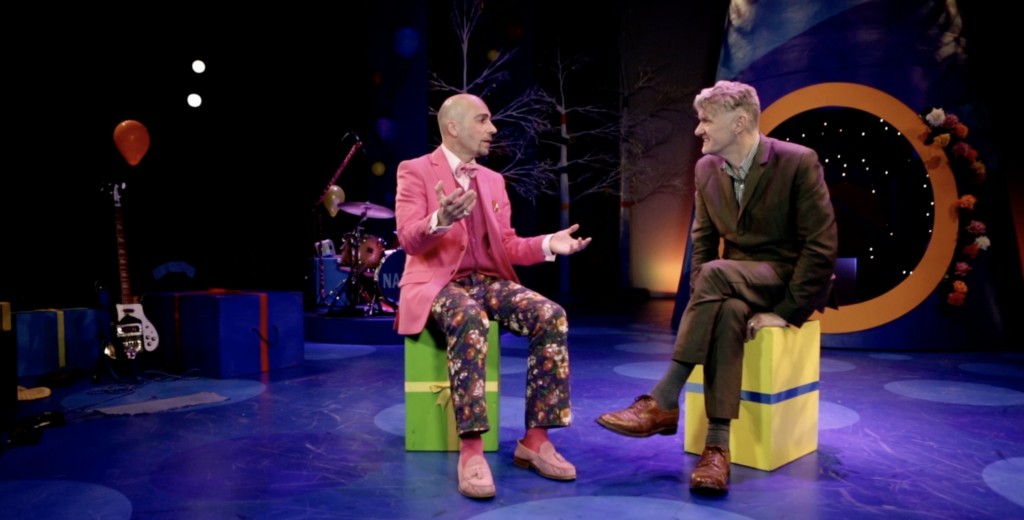
When talking candidly with Harry Hamer, the Chumbawamba drummer now a member of the Labour Party and a performer in lighthearted community theater, seems to sum up the situation with the sentiment, “We were angry young men, weren’t we? And it’s harder to be an angry older man…”
With very little official media released specifically on the group’s history save for a Wikipedia page and a handful of podcasts and YouTube videos that do a predictably inadequate job of capturing 30 years as a band, I Get Knocked Down may be the best and only feature length document out there showing the band’s past and the array of music that they created together – some of the most inspiring albums this author has heard – and then follows them through the fore, during and fallout of the decision to find a larger audience via a major label. The film crawls through the internal baggage and conflict of those who were there, and emerges, over a decade after their ultimate break up, with each former member participating in a roundtable autopsy of the group, and Bruce building a more complete picture of if their initial goals and desires were accomplished.
92 minutes in length. Released by So&So Pictures. Made available for streaming in 2023.
Available for rent or purchase on:

